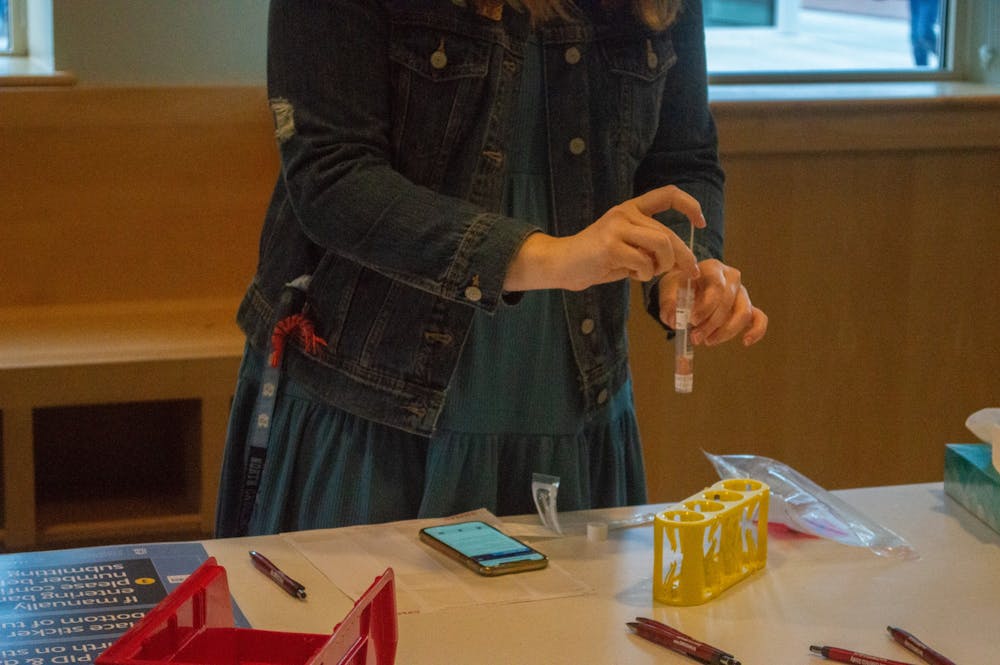Dr. Amir Barzin, the medical director at The Family Medicine Center at Chapel Hill, said testing students living in the Chapel Hill area is important to keeping UNC’s surrounding communities safe.
“We're sitting in a wonderful town,” Barzin said. “Our job is also to make sure that people in the town of Chapel Hill aren’t sick.”
Each of UNC’s three testing sites — where students living in the area will be required to get tested during the spring term — were established with safety and wellness in mind, University spokesperson Kate Maroney said in an email.
Testing sites adhere to several safety measures, such as social distance markers placed in lines and a mask mandate. UNC has also installed air filtration units to maximize air exchange and ventilation, Maroney said.
But some remote students continue to feel that reporting to campus puts their health at risk.
Rahne Hartman, a junior studying peace, war and defense and political science, said she grew concerned about possible COVID-19 exposure upon hearing about long lines for testing at the Carolina Union before the holiday break.
“I never saw what that testing looked like,” Hartman said. “I had just heard that it was very chaotic.”
Sunday afternoon before the first day of the spring semester, there were lines that extended, at some points, from the Carolina Union to Venable Lots — a roughly seven-minute walk away.
In an effort to understand why she was being required to test every week, Hartman contacted a representative from the Carolina Together Testing Program two weeks ago through a form on its website. Within days, she said she spoke to a physician who elaborated on some of the safety measures at testing sites.
“Being told that the number of people that would be inside would be limited and that distance did feel reassuring to me,” Hartman said. “I feel that the largest problem is that the University isn't being super transparent with all of the information.”
She said she plans to walk to her nearest testing site, the CURRENT ArtSpace on Franklin Street, every week during the spring semester to minimize contact.
“I am hoping that it will be fast, in and out, like I was told,” Hartman said.
To get the day's news and headlines in your inbox each morning, sign up for our email newsletters.
The University can grant exceptions to students if they are not able to comply with the testing program.
Dean of Students Desirée Rieckenberg said exceptions are granted on a limited status based on a student’s individual circumstances. She said she expects most cases to be resolved by finding resources and alternative solutions to help students get tested.
“Sometimes it's just about being able to make sure they get connected to the right information," Rieckenberg said, "because we recognize this information is all over the place and is sometimes a little more challenging to find."
Ashlyn Trotter, an incoming first-year student living with six roommates, said UNC’s testing initiative is a reasonable way of ensuring students stay safe while living in the area.
“I think it helps (Chapel Hill) to being reassured that UNC is holding the students accountable and making them get tested, and taking precautions,” Trotter said.
One of her roommates, Ankitha Shenoy, agreed. But she also said one of her main concerns is the possibility of coming into contact with someone in a testing line who is carrying the virus.
“I don’t want there to be a long line,” Shenoy said. “There's a higher chance of spreading it if one person does have it.”
Trotter and Shenoy said they scheduled their re-entry test appointments at the same time on Sunday afternoon. Over the course of the semester, the roommates plan to get tested at the same time, either by carpooling or taking the bus.
Shenoy said she is fearful of how successful the program will be over the course of the semester, given UNC’s failed fall reopening plan.
“I'm just scared that it won't be as organized as they say it is," Shenoy said. "Because, as much as they like to say they have this plan, they were supposed to have a plan for the fall."
Senior writer Rachel Crumpler contributed reporting.
@Heidi_perez02
university@dailytarheel.com



